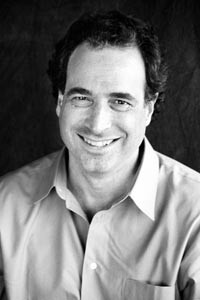Buying one's food locally grown has become perilously fashionable, but author and activist Michael Shuman says that getting sustenance from nearby fields should be just the start of efforts to rebuild our economy.
Shuman holds that economics shouldn't be only about profit -- though he's all for private wealth -- but instead about the well-being of workers, communities and ecosystems long bullied by heedless, distantly owned corporations. The way to both stabilize and invigorate the economy, he says, is to make communities self-reliant, with locally owned businesses producing as much of what they need as possible.
Shuman speaks at Carnegie Mellon University on Feb. 26 as part of a lecture series on local, sustainable and equitable economic development. The author of Going Local: Creating Self-Reliant Communities in a Global Age (2000) has earned praise from such environmentalists and advocates of "place-based" economics as Paul Hawken and Bill McKibben.
One way to approach his ideas is through the stomach, if only because we've already heard so much about reducing our carbon footprints by buying local, instead of importing the average edible from 1,500 miles away. Shuman himself calls local food an "essential" strategy against global warming. But it's also part of a bigger picture.
Like the overall economy, Shuman argues, food production and distribution have become too centralized and wasteful. In 1900, Shuman says, farmers received 40 cents of every dollar spent on food; now farmers gets 7 cents, with 73 cents going to marketing, transportation and the like. That leaves plenty of room for the kind of cost-cutting enjoyed by patrons of farmer's markets, which have boomed in recent years. And as scarcer and costlier oil -- not to mention climate-change-induced disruptions to agriculture -- continue to increase food prices, eating local will only taste sweeter.
Shuman's rhetoric can be fiery. In The Small-Mart Revolution: How Local Businesses Are Beating the Global Competition (2006), he writes: "Wal-Mart is arguably the greatest destroyer of communities on the planet." He inveighs against the alleged "savings" of a few dollars when whole communities are ravaged by rootless corporations that extort tax breaks for jobs, and by investors who favor big guys over small businesses.
Shuman also opposes centralized governmental solutions to local problems, and he's that rare breed of writer who can claim bylines in both left-wing The Nation and right-wing The Weekly Standard. He hopes, in fact, to assemble a "green/conservative coalition" that will seek progressive ends with conservative means." His tools include: the multiplier effect -- keeping money local, where it generates wealth through re-spending; promoting groups like Virginia-based Appalachian Sustainable Development, which facilitates sales of locally grown organic produce; and talking up local business networks like Dine Originals, a national trade organization that helps hundreds of independent restaurants share resources to compete with chains.
One of Shuman's favorite localizer stories, though, involves shifting his own mortgage from the multinational Bank of America to a credit union. The move saved him several hundred dollars a year -- money he invests in his affection for single-malt whiskey from Scotland. "Localization is a wealth-producing strategy," he says by phone from his office at the Training & Development Corp., a Washington, D.C.-based think tank and management firm.
But don't overseas imports kinda broaden one's carbon footprint? Sure, Shuman admits -- but there are ways to mitigate that. One is to replace high-weight imports (grains or meat) with local produce, and import only lower-volume, higher-value stuff. Another is "green taxes" -- consumption taxes reflecting the currently unpenalized cost to the environment of pollution and nonrenewable energy usage.
In the short term, Shuman even has a place-based solution for lunch: "It's really rare that you can't find a local diner that has food as bad as a McDonald's."
Michael Shuman speaks at the Local Economy and Urban Farming Public Lecture Series 5 p.m. Tue., Feb. 26. Rangos 3, University Center, Carnegie Mellon University campus, Oakland. Free.















